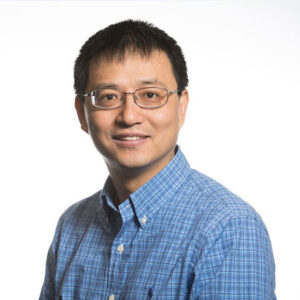Yousu Chen
Home / Yousu Chen
Presentations:
Accelerating the Clean Energy Transition with Data Analytics and Advanced Computing
The power grid is evolving rapidly to meet the requirements of the clean energy transition. This evolution involves an increasing penetration of renewable energy resources and new complexities with a larger number of devices and controls spread across transmission and distribution networks. Consequently, we face significant challenges in managing the fundamental shift in power system physics. Fortunately, with more data available than ever and enhanced computing capabilities, we now have essential tools that help us understand and manage these complexities.
Data analytics and computing can play a crucial role in accelerating the clean energy transition and building a more sustainable future. By analyzing data collected from across the energy system with advanced data analytics and computing technologies, we gain opportunities to enhance grid management, control, and optimization. However, the challenges also arise with significantly increased data volume and model complexity. This demands faster computation and the development of new analytics methods.
This presentation will explore the challenges and opportunities of the clean energy transition, highlighting how data, data analytics, and computing converge to enable a future grid that is not only clean, but also reliable and resilient. The related research activities and tools to address these challenges will also be discussed.
High Performance Computational Advancements in Power Systems
Electricity infrastructure has been called the most complex machine man has ever built. It has served us remarkably well but is likely to see more changes over the next decade than it has seen over the past century. The widespread deployment of renewable generation, smart grid controls, energy storage, plug-in hybrids, and other emerging technologies will require fundamental changes in the operational concepts and principal components of the grid. The grid is in an unprecedented transition that poses significant challenges in grid operation, planning, and policy decision. The challenges are a result of more data, larger systems, and more complex models. Therefore, the traditional power system simulation and modeling algorithms need to evolve accordingly to provide fast results for power grid operation and planning in the future grid environment. High performance computing (HPC) techniques are an enable factor to make this happen.
To bring HPC to power grid applications is not simply adding more computing units to solve the problem. It requires careful design and coding to match an application with computing hardware, which requires reformulate the traditional power grid algorithms for high-performance computing platforms. The improved performance is expected to have a significant impact on how power grids are operated and managed, ultimately leading to better reliability and asset utilization for the power industry.
This lecture discusses the evolution of power grid, the driven force for new modeling and simulation algorithms, and presents how some traditional power system applications can be improved with the emerging high-performance computing resource.
Is it Coming Soon to Power System: Quantum Computing and Its Early Exploration
With the global trend of pursuing clean energy and decarbonization, power systems have been evolving in a fast pace that we have never seen in the history of electrification. Quantum computing (QC) as an emerging technology has been well recognized and holds promises to significantly revolutionize computing for many complex problems, including power systems.
This presentation will review the evolution of power system modeling and simulation, as well as the examples of advanced computing tool development for power systems. Some early quantum computing research outcomes in power system, such as a quantum neural network application in contingency analysis and a flexible framework for efficient quantum linear solvers in Power Systems will be introduced. The vision and next steps in developing quantum computing applications for power systems will also be discussed.
© Copyright 2023 IEEE — All rights reserved. A not-for-profit organization, IEEE is the world’s largest technical professional organization dedicated to advancing technology for the benefit of humanity.


